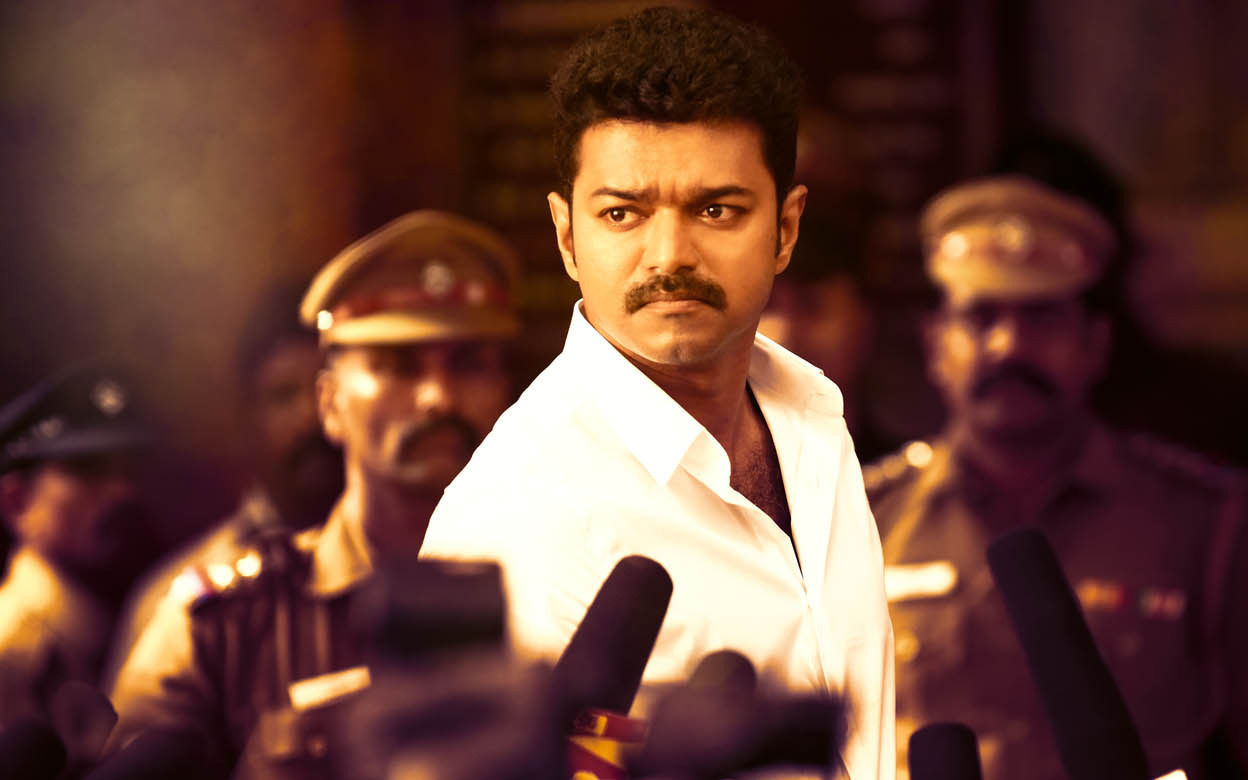The row erupted over newly released Tamil film, Mersal, for its politically loaded dialogues on Goods and Services Tax, Gorakhpur incidents and Centre government’s push towards digital economy indicate ruling Bharatiya Janata Party's (BJP) intolerance towards creative criticism.
Tamil superstar Vijay's Diwali release Mersal provoked BJP persons across the country over its critical stands on the government’s much-celebrated policies. Demanding cuts in the film, Tamil Nadu BJP unit chief Tamilisai Soundararajan alleged that some dialogues portray “untruths” about GST and the digital India campaign.
Following the demand of Soundararajan, Union Minister Pon Radhakrishnan said , "The film producer should remove the untruths regarding GST from the film."
The film, directed by Atlee Kumar, has been running in closely packed theatres since release. The frequent critic of BJP’s communal polarisation agendas AR Rahman has composed the music for the film.
The popular actor Vijay performs three different characters in the film- a magician, a doctor and a village rebel. As the film progresses with commercial elements and in one of the scenes, Vijay's character in the film bemoans at the government's inability to provide free healthcare for all citizens despite "high" GST rates in India, saying Singapore is able to fund a free health scheme despite a much lower GST rate than India.
Referring to the dialogues in the film, Soundararajan said:"Intentionally they want to criticise the central government… They cannot appreciate efforts of PM Modi ji."
The opposition DMK and some prominent personalities from the film industry have extended their support to the film.
"The BJP is acting as a super film certification board and curbing democratic rights," DMK spokesperson A Saravanan lashed out at BJP.
From the film industry stars including Kamal Hassan, Khushbu Sunder, Vijay Sethupathi, Arvind Swamy and Mani Ratnam have stood alongside with “freedom of expression” and Mersal.
“Mersal was certified. Don't re-censor it. Counter-criticism with logical response. Don't silence critics. India will shine when it speaks.” Kamal Hassan wrote on Twitter.
As the controversy progresses, the team Mersal has said that the film has obtained board’s certification and the "matter ends there". But the controversy which attained communal angles, when BJP leader H Raja termed it as “Joseph Vijay’s hate campaign against (Prime Minister) Modi”, indicates that the matter will not end here.
However, Mersal isn't the only film which faced uproar from the BJP and Sangh organisations over the politically loaded dialogues. Earlier, Central Board of Film Certification (CBFC) has axed “certain” scenes from the documentary Argumentative Indian and a Bengali film Shunyota (Emptiness).
Shunyota, the film based on the hard after effects of demonetisation on the common man, was censored by CBFC regional office in Calcutta in late March this year. CBFC had recommended six cuts which included the comments on the result of the demonetisation- death processions, big fishes and some dialogues between a mother-daughter. The Censor Board had suggested that these parts should be deleted or kept mute with a bleep.
"My film talks about the way demonetisation affected the lives of a cross-section of people. I talk about a villager who is saving money for her daughter's wedding. I talk about a man in the hospital who is suddenly helpless without cash. I based my films on various stories I heard and read about," said Ghosh.
The Argumentative Indian, a documentary on Nobel laureate Amartya Sen by economist Suman Ghosh, has been censored by the CBFC’s office in Esplanade, Calcutta on July this year. The censors have urged Ghosh to bleep out the words "Gujarat", "cow", "Hindutva view of India" and "Hindu India" used in the context of the present political scenario in the country.
Ghosh was told that the documentary could be only released with U/A certificate if he beeped out the words mentioned by CBFC.
"The attitude of the censor board just underlines the relevance of the documentary in which Sen highlights the growing intolerance in India. Such scrutiny of any criticism of the government in a democratic country is shocking. There is no way I would agree to beep or mute or change anything that one of the greatest minds of our times has said in the documentary," Ghosh reacted against censor board’s action.
The censor board has not only biased against political comments on government policies, also stood against homosexuality. In January, the board refused to certify the film “Lipstick Under My Burkha” produced by Prakash Jha which explores the struggles and sexuality of four women in a small town. The argument from the board was that the film is too “lady oriented” and contained audio pornography.
Again, recent controversies over Sanjay Leela Bhansali’s Padmavati and Nawazuddin Siddiqui’s Babumoshai Bandookbaaz assert the question of state’s intervention in freedom of expression.





